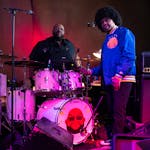Club Nomadic Entertainment Group has dropped a federal lawsuit that accused Mystic Lake Casino of breaching its contract after casino officials abruptly shelved its glitzy pop-up concert venue before Super Bowl LII.
Promoters had sunk $2.4 million into the Vegas-style nightclub before the Shakopee Mdewakanton Sioux Community scrapped the facility, announcing Jan. 12 that the four-day event "would not be up to our standards of quality."
Now Club Nomadic must spend an estimated $1 million tearing down the 65,000-square-foot temporary structure built in the casino's parking lot for the event.
Scheduled concerts by Gwen Stefani, Florida Georgia Line, the Chainsmokers and Kygo were moved inside the casino and downsized, and ticket prices were slashed. The star-studded series was touted as the south metro's largest recreational draw and had been expected to lure thousands of Super Bowl visitors to the Prior Lake complex, a half-hour from U.S. Bank Stadium in downtown Minneapolis.
Construction began last fall and was substantially complete by early January. The venue's concrete floors, winterized metallic walls and VIP balconies had taken shape as crews worked to finish the stage and interior decor.
Club Nomadic promoters were racing toward a Jan. 15 completion date when their contract with Dakota February Events — Mystic Lake's events company — was canceled a few days before the deadline, according to a lawsuit filed last month.
Dakota February Events said Nomadic breached its contract by failing to obtain a certificate of occupancy by a Jan. 1 deadline, and Nomadic blamed the casino for intentionally delaying the ambitious project.
At the time, an attorney for Dakota February Events said the casino's company was fully within its right to terminate the contract and would "vigorously defend that decision."
The lawsuit's dismissal comes less than a week after U.S. District Court Judge Joan Ericksen ordered Club Nomadic to "show cause, if any, why this action should not be dismissed for lack of subject-matter jurisdiction" — essentially challenging Nomadic to show why the court had authority over a sovereign American Indian tribe. The suit was dismissed without prejudice, meaning it could be refiled.
Willie Hardacker, general legal counsel for Mystic Lake's events company, said in a statement that the tribe is pleased with Nomadic's decision to drop the case.
"The court rightfully had concerns about whether it had jurisdiction over this dispute," Hardacker said.
He added that Dakota February Events had "claims against Nomadic, and we will pursue those over the coming weeks." Officials declined to specify exactly what those claims were.
Attorneys for Club Nomadic didn't return calls for comment.
Liz Sawyer • 612-673-4648





